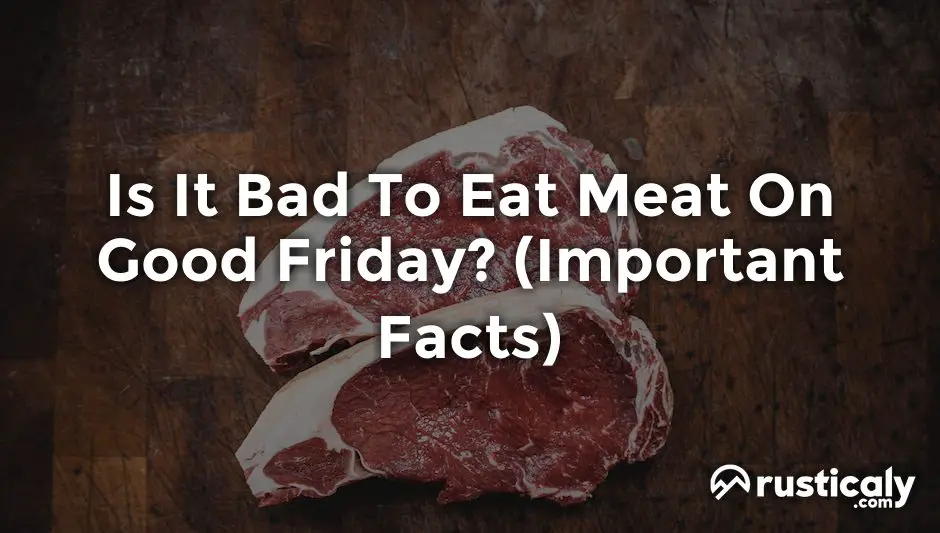Good Friday is the religious holiday commemorating Jesus Christ’s crucifixion and death. It’s observed by Christians, primarily in the Catholic faith. Good Friday lands during Holy Week, right before Easter Sunday.
On this solemn day, Catholics often fast or abstain from meat as a form of sacrifice and repentance. This leads many to ask – can you eat bacon on Good Friday?
Below we’ll explore the Catholic rules for Good Friday, dive into the reasons behind fasting from meat, and outline whether bacon is allowed.
Good Friday Fasting Rules for Catholics
Here are the official Catholic fasting guidelines for Good Friday:
-
Catholics ages 18-59 should fast on Good Friday This means limiting yourself to one full meal and two smaller meals that together don’t equal a full meal
-
No meat consumption allowed for Catholics age 14 and up.
-
Snacking between meals is not permitted, but liquids like milk, juice, tea and coffee are allowed.
These fasting practices are meant to be a sacrifice that brings you closer to God and helps you identify with Jesus’ suffering.
Why Do Catholics Fast from Meat on Good Friday?
Abstaining from meat on Good Friday is a long-standing Catholic tradition dating back centuries. Here are some of the reasons behind this practice:
-
To commemorate Christ’s sacrifice of his flesh on the cross
-
To unify Catholics through a shared sacrifice
-
To create awareness of Christ’s suffering and crucifixion
-
To practice self-denial and restraint
-
To show sorrow for sins and repentance
-
To show gratitude for Christ’s sacrifice for humanity’s salvation
Giving up meat is a symbolic gesture and spiritual discipline. Many Catholics view it as an important way to align themselves with Christ’s crucifixion.
Is Bacon Off Limits on Good Friday?
Yes, bacon is considered off limits on Good Friday for Catholics adhering to church guidelines.
While fish, eggs, dairy products, and vegetables are permitted, the rules prohibit all meats – including beef, poultry, pork and bacon.
Even if the bacon is just a topping or minor ingredient, consuming it would still be considered breaking the Good Friday fast.
Bacon comes from pork, which is defined as meat by the Catholic church. So no bacon should be eaten by Catholics practicing the Good Friday fast.
There are a few exceptions, which we’ll cover next. But in general, bacon is a no-go.
Exceptions to the No Meat Rule
While the standard Catholic rule is complete abstinence from meat on Good Friday, there are a few exceptions:
-
Medical conditions – People with medical needs requiring meat intake can be excused.
-
Age – The requirement applies to Catholics age 14 and up. Younger children are not expected to adhere to fasting practices.
-
Pregnancy or nursing – Women with special nutritional needs may be exempt.
-
Disabilities – Those unable to fast for health reasons can be excused.
-
Military service – Catholics in the armed forces are often dispensed from fasting requirements.
-
Location – In some regions, bishops can modify or provide dispensation from the rules.
So in special circumstances like medical needs or military service, bacon may be permitted on Good Friday. But the average practicing Catholic should abstain.
Tips for Observing the Good Friday Fast
If you plan to observe the Good Friday fast and abstain from meat, here are some tips:
- Make a lentil or veggie soup
- Enjoy fish like salmon or tilapia
- Roast a variety of vegetables with olive oil
- Cook up beans, rice, potatoes or pasta
- Enjoy eggs, cheese, yogurt or milk for protein
- Try peanut butter on toast for a filling plant-based meal
- Get creative with meatless pizza, tacos, sandwiches and more
- Check labels for hidden meat products like broths or gelatin
- Stock up on fasting-friendly items beforehand to remove temptation
With a little preparation, you can find plenty of delicious meatless meals to enjoy on Good Friday.
Common Questions about Fasting from Meat
Here are answers to some frequently asked questions about abstaining from meat on Good Friday:
Are seafood and fish allowed?
Yes, seafood and fish are permitted. Since they come from the ocean rather than animals, they are classified differently than other meats.
What about chicken or turkey?
No, poultry is still considered meat and therefore not allowed on Good Friday. Eggs are permitted though.
Is eating dairy against the rules?
No, dairy products like milk, cheese, butter and yogurt are allowed. Only meat from warm-blooded land animals is prohibited.
What if you accidentally eat meat on Good Friday?
It’s not a major sin. Simply ask for forgiveness and try your best to get back on track with the fast. Don’t dwell on accidents – just refocus.
Should Non-Catholics Observe Good Friday Fasting?
Non-Catholics are not required to follow Catholic fasting practices on Good Friday. However, many still choose to observe parts of the tradition as a way to connect with Christ’s crucifixion.
If you decide to give up meat for all or part of Good Friday, approach it as a personal spiritual practice rather than a strict obligation. Let it enhance your own reflection on Easter and Christ’s sacrifice.
The Meaning Behind the Meatless Sacrifice
Whatever your religious affiliation, the tradition of abstaining from meat on Good Friday can serve as a powerful symbol of sacrifice, repentance and appreciation.
By giving up beloved foods like bacon for just one day, we create space to reflect on Christ’s ultimate sacrifice for humanity. The small discomfort of hunger and restraint leads to a deeper connection with Christian beliefs surrounding Easter.
This sentiment is beautifully summed up in this quote:
“It’s Good Friday. Good because 2000 years ago the events of today dramatically changed the world for the better.”
So can you eat bacon on Good Friday? The choice is personal. But abstaining can serve as a meaningful way to commemorate Good Friday for both Catholics and non-Catholics alike.

